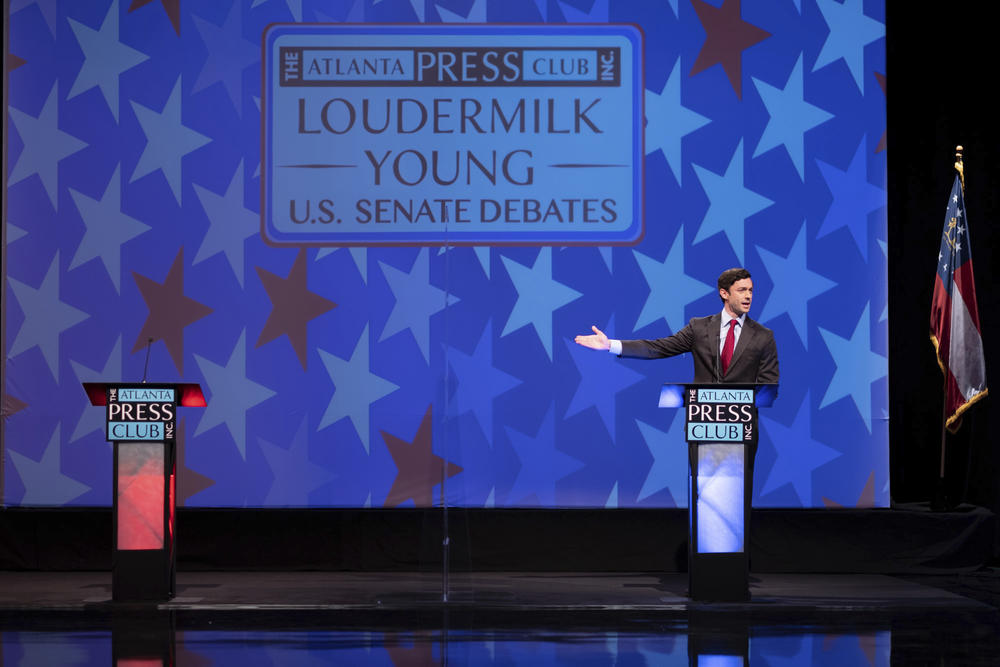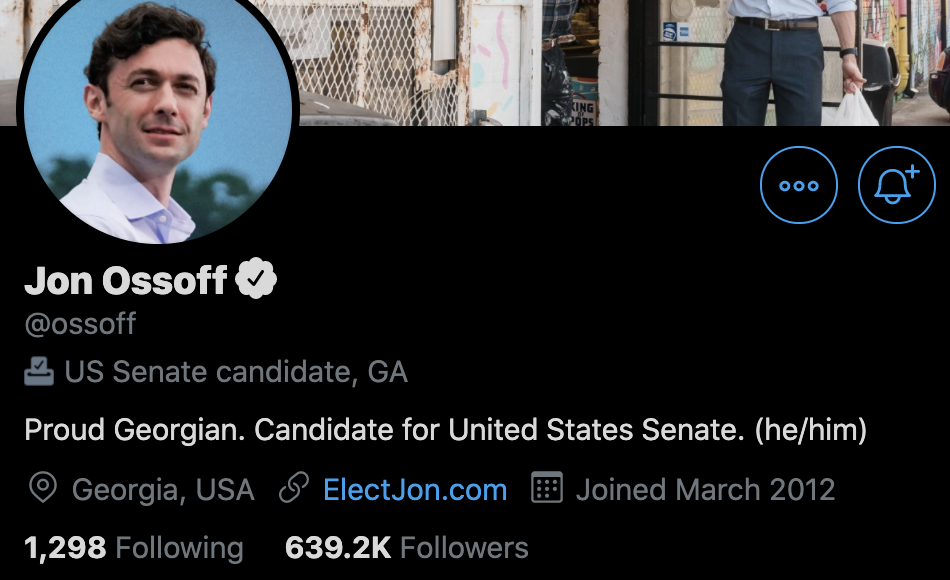
Caption
Democratic challenger Jon Ossoff speaks during a debate for U.S. Senate on Sunday, Dec. 6, 2020, in Atlanta. Sen. David Perdue declined to attend the debate.
Credit: AP Photo/Ben Gray, Pool
|Updated: December 8, 2020 9:27 AM
Following his "solo" debate on Sunday night sponsored by the Atlanta Press Club, Senate candidate Jon Ossoff spoke with GPB News' Sarah Rose on LGBTQ+ issues, preserving music and entertainment venues across the state in the wake of the COVID-19 pandemic, and his favorite Outkast song.

Democratic challenger Jon Ossoff speaks during a debate for U.S. Senate on Sunday, Dec. 6, 2020, in Atlanta. Sen. David Perdue declined to attend the debate.
Sarah Rose: Thanks for joining me. First of all, how are you feeling coming out of your solo debate against Sen. [David] Perdue’s empty podium last night?
Jon Ossoff: It's sad that our senator is too much of a coward to debate in public at a moment like this when families need economic relief and this virus is spreading out of control. But while he hides, I'm going to keep taking this message directly to the people. This is about health, jobs and justice for the people in a crisis. We need everybody to get out to the polls and vote. And early voting starts next week, Dec. 14.
SR: I’d like to touch on some issues specifically important to LGBTQ Georgians. First, I'd ask you about the legal status of nonbinary Americans. Legislation was introduced in the House earlier this year to add a third gender designation to U.S. passports, and 18 states — excluding Georgia — have allowed for some form of nonbinary distinction on state IDs and driver's licenses. This is an issue of mixed opinion even within the queer community, but do you support an effort to give legal recognition to nonbinary people on both the federal level and in Georgia?
RELATED: Nonbinary Georgians Raise Concerns, Questions As Other States Offer Legal Recognition
JO: Yes, people should be able to define their gender and their identity however they see fit. It's not a matter for the state to impose what choices we have. And I also support a broader effort to ensure that there is true equality in this country and that Americans don't face discrimination on the basis of their sexual orientation or their gender. That's why I support passage of the Equality Act. That's why I support passage of a new Civil Rights Act. And I'm running against David Perdue, who is an anti-LGBTQ bigot, an extremist who supports discrimination against gay people and who opposed marriage equality at the Supreme Court.
SR: Organizations like LAMBDA Legal have argued that transitional care for trans people is not elective, but medically necessary and in some cases, life-saving. Would you agree with that assessment?
JO: I don't have the expertise to weigh in on what's life-saving versus elective, but I support everybody's right to live their life as they choose and to access the care that they need.
SR: One of the hardest things for any transgender person is trying to figure out how to make health care work for them. The process is often stigmatized and misunderstood — and can continue to be complicated even after someone has health insurance coverage. Adding on top of that, the Trump administration tried to axe health care protections for transgender Americans earlier this year. You’ve said before you’re opposed to Medicare-for-all, but comprehensive health care is out of reach for a lot of young queer people. So, what advice do you have for them?
JO: Well, we need to get everybody in America great insurance, and I support a strong public option that's free for the poor, that's affordable for everybody, and that's comprehensive. And that means not just primary care and prescriptions, but also preventative health care, urgent care, hearing, vision, dental — everything that a person or a family needs to remain in good health. And let me be very clear about this: I will defend every Georgian's right to purchase private insurance if that's what they want, and I oppose abolition of the private health insurance market. I've never seen a case for it. And that's why I don't support the Sanders legislation. But I do believe that we need to get to 100% insurance coverage. I believe that health care is a human right and I believe that we get there with a strong public option.
SR: I was talking with people and they were asking me what I was going to ask you. And one thing that came up a lot was LGBTQ homelessness in the state. What are we doing right now and what should we be doing differently to address LGBTQ homelessness in Atlanta and also around Georgia?
JO: I think there's two levels here. First of all, there's the acute crisis of homelessness, which is a function of poverty. And too often we treat homelessness like it's a criminal justice issue, just as too often we treat poverty more broadly like it's a criminal justice issue. And what's required are economic and health interventions. So I am so distraught at the level of homelessness in Atlanta and across the state — and especially right now, during this crisis, it's getting worse. It's almost like we've given up as a people on the idea that we can eliminate poverty. You know, that used to be a dream, an ambition, a goal of our political leaders and of our society. We barely talk about poverty anymore. We should reanimate that dream that we can end poverty, that we can end homelessness. We should not accept that these are the inevitable consequences of inequality or that some level of poverty or some level of homelessness is acceptable. There is no level of poverty and no level of homelessness that's acceptable. And one of the reasons that so many LGBTQ young people find themselves homeless is because we're not investing in their health and their care. We're not protecting them from bullying. We're not giving them access to the care and the mental health care services they need in the primary health care services that they need because it's still taboo in some parts of our society. We need to be able to have an open conversation about these issues and we need to be there for our fellow human beings no matter what they're going through. And we need to stand up for those who face bullying. Who else is underrepresented among the homeless? It's veterans. Because veterans experience trauma and then don't have access to the care that they need to manage that trauma and to recover. So we have to become a more empathetic society, a more compassionate society, a kinder society. We cannot accept that poverty and homelessness are inevitable. And we need to make those investments in health care and social services to help people who are struggling.
SR: For so many queer people, especially trans women of color, there are often lots of barriers to employment. You mentioned you would be a vote for the Equality Act that Joe Biden hopes to pass in his first 100 days. If elected, you’re going to have the opportunity to staff an office both here in the state and on the Hill in DC. Would you be willing to commit to hiring at least one trans woman of color for your Senate staff?
JO: Well, what I commit is that my Senate staff will represent the great diversity of the state of Georgia. And with all due respect, before I start making commitments on hiring staff members from particular communities, the broader commitment that I'll make is that I will have a very diverse Senate staff and I will endeavor to make sure that its diversity reflects our state's diversity because representation matters in the staffing of a Senate office — because we need people who represent diverse communities and diverse backgrounds to constitute the team that I will lead to make decisions about legislation and to render service to the state. That is why diversity on my Senate staff will be so important. And as for the Equality Act, this is perhaps the most important message that people need to hear: We will not be able to pass this legislation unless we win these two Senate races in Georgia. We will not be able to to pass legislation that helps young trans people who are being bullied and who face discrimination, unless we win these two U.S. Senate races in Georgia. We will not be able to pass a new Civil Rights Act to reform our criminal justice system and police brutality and mass incarceration for nonviolent drug offenders, unless we win these two Senate races. And folks need to make a plan to get out there and vote with early voting beginning on Dec. 14.

Jon Ossoff updated his twitter bio to include his pronouns during the interview.
SR: One thing we’ve seen in the past year is an effort to normalize pronoun clarification. Atlanta Mayor Keisha Lance Bottoms confirmed to us through her Director of LGBTQ Affairs Malik Brown that she’s committed to putting her pronouns in her social media information. Is that something you’d be open to doing?
JO: Absolutely open to doing that and let me get with my team about how we do that, I don't necessarily know all the particulars. Is that something you just put in the bio field on your Twitter bio?
SR: Yes.
JO: Yeah, I'll do it right now.
RELATED: Atlanta's New Director of LGBTQ Affairs: 'Much Of Focus' Will Be On Trans, Nonbinary Equality
SR: Switching gears a little, something I’ve reported on a lot throughout this year are the special difficulties that music venues are facing throughout the state in the wake of the pandemic, including spaces like The Masquerade and Center Stage. The National Independent Venue Association has advocated for federal and state assistance for these spaces and has even said that 90% of the nation’s music venues could be at risk of closing without some kind of intervention. Would you support additional government aid to keep these spaces open?
JO: Yes, well, I support immediate direct relief for small and medium-sized businesses who are struggling right now — and right now, as you said, among those businesses who have been hit hardest during this time are those that host live events, live venues, concert venues, theaters, sports arenas. You know what? We want to bring people together to watch a show or to see an event. And we can't do that any more because public health situation doesn't permit it. The last time I was at The Masquerade, by the way, I saw [comedian Dave] Chappelle. The Masquerade is a beautiful and storied institution here in Atlanta and its survival and success are really important to me.
RELATED: Center Stage: 'There's A Risk For All Music Venues To Close'
SR: Were you were you disappointed when the Masquerade moved locations from North Avenue to Underground Atlanta?
JO: I don't know if I was disappointed, but I certainly remember it as an institution being there at North Ave.
SR: I'm not sure I've ever seen anyone ask you before what your favorite music is. What bands do you listen to?
JO: I listen to jazz. I listen to classical. I listen to hip-hop. I grew up listening to Outkast. I've been listening to a lot more jazz and classical during this political season because it kind of keeps me relaxed. I like jazz classics.
SR: What's your favorite Outkast song?
JO: "SpottieOttieDopaliscious."
GPB News has also reached out to the campaigns of Sen. Loeffler, Sen. Perdue and Raphael Warnock with interview requests. Ossoff faces Perdue in a runoff election on Jan. 5.